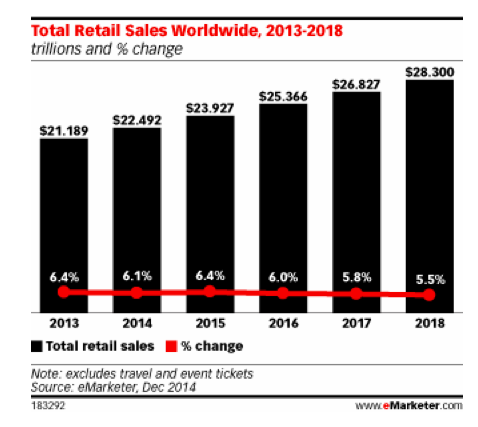Global Retail: U.S. Retailers' Guide to Selling Internationally

In today’s digital market space, businesses and consumer interact, sell, and buy their local borders. The e-commerce world provides access to foreign markets, without retailers ever having to leave the U.S.
Numbers point to the promising future of global retail: In 2014, global retail sales, including both in-store and online purchases, surpassed $22 trillion, according to eMarketer. The marketing research firm also predicts a 5.5 % increase in overall international retail sales to $28.3 trillion by 2018. Further, the U.S. is predicted to leads retail eCommerce sales, following only China.

These figures come as good news: they present opportunities for growth into unprecedented markets. Businesses looking to navigate beyond U.S. borders into the world of global retail via e-commerce channels should read this guide.
The world of global retail is challenging in many different ways. Businesses should keep these challenges in mind when expanding overseas:
For additional details on these challenges and tips on how to tackle these challenges of global retail, click here.
A number of e-commerce sites can help retailers enter the global retail world and begin selling internationally without having to build traditional brick-and-mortar stores in foreign markets. Each site has special features and benefits that help retailers expand their business, while simultaneously helping to address a number of the traditional global retail barriers.
These are:
* Note that we will continue to expand this list and add additional features
Amazon Global Selling: 
Amazon Global Selling has operations in ten international marketplaces — the United States, Canada, the U.K. Germany, France, Italy, Spain China, Japan, and India — and customers in nearly 180 countries. The tools within Amazon’s Global Selling program make it an attractive international marketplace for sellers: from product listing, to communicating with customers in local languages, converting currency, fulfilling international shipments, navigating customs and duties, this international marketplace is a one-stop shop for global retail.
eBay:
Retailers of all sizes use eBay, a top 10 global retail brand, to reach buyers beyond U.S. borders. eBay is an international marketplace with worldwide sites in 27 countries through the Americas, Europe, Asia/Pacific and 149 million active buyers who come from 208 countries around the world. Its features: International Site Visibility, its Global Shipping Program, international payments through PayPal, and more, help to address some of the traditional challenges to global retail.
Alibaba: 
With sales greater than Amazon and eBay combined and claim to the largest IPO in U.S. history, this Chinese e-commerce company is a destination for U.S. businesses is looking to wholesale in bulk, or to buy products for their business. Key features of the international e-commerce site, such as its multi-language sites, a Verified and Gold Suppliers classification system, inspection services, trade assurance, and more, help retailers meet both their domestic and global retail goals.
Tmall and Tmall Global: 
Advertised as the “fast track into China,” by parent company, Alibaba, these marketplaces provide access to China’s 307 million active online buyers, who are avid online shoppers. There are many features and benefits, including customer trust of the site, the use of Alipay which is a trusted payment method, the storage of inventory in bonded warehouses, the ability to retain business autonomy and brand identity, and more. These features and benefits make the Tmall sites a great option for expanding global retail in China.
